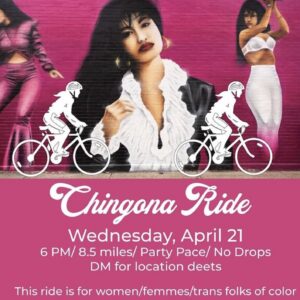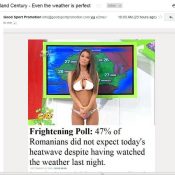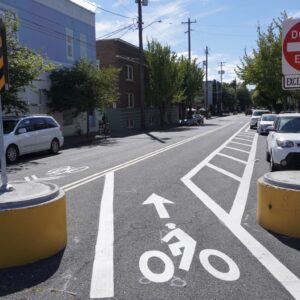When City of Portland Transportation Planner Sean Doyle presented the 2023 PBOT bike counts at a meeting last week, he pointed to one figure in particular he feels is, “an important indicator of the quality of our bike network.” That figure was the number of women who ride.
Now, BikeLoud PDX is sharing a Women Biking in Portland survey that aims to learn more about women and cycling with an aim to achieve gender parity.
While a 50/50 split of men and women riding is the goal, Portland has never come close to that. When PBOT first began counting bicycle riders in the 1990s, the number of women on bikes was estimated to be about 20%. The number grew steadily, and between 2003 and 2021, PBOT found that about 31-32% of all riders were women.
But for the past two years, the number has dropped several percentage points and is now at around 29%, its lowest point since 2006. East of I-205, PBOT’s latest counts found that only 17% of bicycle riders are women. “Since the start of the pandemic, the gender split in people biking widened,” states the PBOT report.
The charts below are from PBOT’s 2022 and 2023 bike counts:






“Not to dampen on the recovery,” said PBOT Bicycle Advisory Committee Chair Ally Holmqvist at their meeting last week, “but the distribution between men and women… looks like we’re back at 2006. And that jumped out to me as starkly concerning.”
BikeLoud PDX volunteer Cathy Tuttle is also concerned and wants to see Portland set on the trajectory of cities like Osaka, Utrecht (where she lives currently), Copenhagen, and Tokyo where women make up 64%, 56%, 55%, and 50% of the cyclists respectively. Tuttle was impressed with “Women’s Freedom,” an initiative led by the nonprofit London Cycling Campaign. Part of that effort is a survey. Tuttle contacted LCC staff and learned they are interested in responses from other cities, so she created a nearly identical survey and is now urging Portlanders to take it.
Some of the questions Tuttle hopes to learn answers to include: Are there lived experiences of people who identify as women that make them more or less likely to continue biking for everyday work, errands, and recreation? Is it a lack of safe routes or harassment from drivers or something else that skews the balance toward fewer women on the road in Portland?
The survey has 22 questions (see a few of them above) and should take about 10 minutes to fill out. Please take this survey and consider sharing it with friends. Find it online here.








Thanks for reading.
BikePortland has served this community with independent community journalism since 2005. We rely on subscriptions from readers like you to survive. Your financial support is vital in keeping this valuable resource alive and well.
Please subscribe today to strengthen and expand our work.
The biggest threat I face as a female cyclist is from homeless people in the bicycle right of way or immediately adjacent.
Antagonistic drivers are highlighted as the primary social threat to cyclists in this survey but unpredictable, often intoxicated, violent, and weapon carrying individuals in greater proximity are conspicuously absent.
The start of the pandemic is also when Portland saw encampments boom along previously safe cycling trails, which tracks with the dip in the timeline they see here.
The survey appears biased and not well designed – revealing results before completion further skews the integrity of the study.
Thanks Nicole. I hear you. Also, I agree that I shouldn’t have referred to any of the results before the survey was closed. I have deleted that sentence.
Nicole,
I agree with you. I don’t use our MUP’s because they’ve become dangerous linear campgrounds. I never have heard the Street Trust calling for the cleanup and end of camping on them. Dangerous drivers are problematic but it seems that is all they focused on in the questionnaire.
Jonathan doesn’t seem to want to address the issue of addict/homeless and their effects on the MUP’s or much of East Portland and Downtown for that matter. I beleive that Nicole, you are correct that he consistently shows a form of bias which I would term extremist left poltics.
Wow you sure have a selective comprehension. I’ve posted several stories about safety concerns on MUPs and even wrote an opinion saying how unacceptable the conditions are.
“Jonathan doesn’t seem to want to address the issue of addict/homeless and their effects…”
This statement is flatly untrue; he has covered the issue regularly for years!
On the other hand, you have enough vague words in the sentence (“seem”, “want to”) that the sentence is possibly non-falsifiable, and is really just a complaint that he’s not writing his website according to *your personal preferences*.
+1 I’m not a female but I am hesitant to take my 2 year old daughter on rides on my bike in many otherwise nice protected bike paths due to homeless.
This is a pretty dumb question IMO, as the (partisan) elected Mayor of London who runs a city of several million has a lot more powers, real and symbolic, than Portland’s mayor, especially as Portland is going through a major government transition. (Obviously the Lord Mayor of London who sort of runs the inner core of London’s 8,000 residents has no powers worth speaking of.)
For me it’s drivers. Traffic volumes have increased, drivers are more distracted, and over the years the volume of outright hostile drivers actively trying to harm me has increased. Probably not per capita, but with more drivers comes more awful people who think it’s perfectly ok to harm someone so long as they’re on a bike even if the percentage of drivers like that stays the same.
Since the infrastructure near my home has continued to languish as a 45mph zone with no bike lanes, shoulders, or typically sidewalks, and the traffic has increased it simply feels too dangerous.
There’s also that I no longer have the raw power I once did so no longer have the ability to evade bad drivers as easily as I once could. Making a living eventually has to take precedence over training rides.
I’m perfectly happy riding slowly as that’s my current fitness level, but not when it means dramatically more time spent vulnerable on the most dangerous stretches of road. Perhaps create a new rule where roads automatically get dropped to 35mph if there is no infrastructure present for those not in cars? At least it would improve the odds of surviving a crash a bit. Wouldn’t have the problems with being unaffordable either like they keep citing as the reason to leave the west hills so insanely hazardous.
And yeah, I’ll agree with the other ladies here that the state of the MUPs is a problem too as it ruins the one truly safe option that is available, if one is willing to drive to reach said infrastructure.
Please see the “Lego” article for a discussion of why having more people here (and thus more drivers and thus more awful people) is actually a good thing for Portland.
As a further note on this topic: the addiction crisis also impacts the type of driving behavior we see as anyone who has walked around East Portland (like me) for years can attest to having gotten much worse. Many of the drivers I see behave, IMO like they are high.
Another survey by the Polling Bureau of Transportation! These folks are so very good at gathering information and keeping their fingers on the pulse of alternative transportation users. Now that we understand the safety concerns of women that cycle and those concerns amongst men, we now just require polling of the LGBTQ+ community and a few listening sessions for dogs and cats. This information will be most helpful in planning a preliminary round of non-binding visioning workshops laying the groundwork for the start of discussions about potential ideas to make roads and pathways safer for bike riders in small pockets of inner East Portland by 2050.
Portland – The City That Does Squat
Hi,
Please read more carefully. The survey has nothing to do with PBOT or City of Portland. It’s from an advocate who copied it from a London campaign and launched it here with help from BikeLoud PDX.
Then it will carry less weight than if this actually was a PBOT survey. LazySpinner makes a good point about our local officials being mostly talk and wishes instead of taking bold action. That’s my frustration. How long has it been dangerous to bike? Forever. We keep spending real money on awareness campaigns, parkways fun rides, bike bridges, and very short stretches of car free infrastructure and deaths keep rising. Clearly, things are not getting better because of studies, surveys, and the patchwork approach.
Is it dangerous to bike?
Riding is probably the safest mode of transportation, judging by the number of associated fatalities.
What data shows that bicycling is so safe? The data I’ve seen shows it around 10x times higher fatality rate per mile than driving.
Cycling has always been among the safest modes (when adjusted for mode-share) in Portland.
Do you have a link to that? I wonder if they covered portland city or the portland transpiration area. Would love to see how it compares. Thanks!
This isn’t a survey — it’s a tool to promote a very specific brand of bike advocacy. The questions are loaded, the respondents are self selected, and it suffers from virtually every form of bias that undermines the legitimacy of results.
Not that it’s relevant, but I’m wondering what the raw numbers were — I’m guessing not much of a cross section of the fairly large number of Portland cyclists ever knew about it.
I took the survey and I hope it helps! Sometimes when I’m commuting to or from work, I find myself riding with a group of women and I feel such a great sense of camaraderie. We’re out here. And it’s really fun!
Safe infrastructure will go a long way to getting people to just give it a try. When people have a successful first few trips in nice weather, that motivates them to keep at it in less ideal conditions. So make the route connections easy/logical, protect the bike lanes (not just paint!!), and keep the lanes clear. Red light/speed cameras – put them everywhere!! Ultimately we need a road culture overhaul, and that happens slowly.
The last thing I want to say about safety is that I volunteer at Lan Su Garden, so I’m often heading into Old Town by myself. Would I walk around down there by myself? Probably not unless I had to! But I have never, ever been harassed by a person on foot while I’m on my bike, anywhere, in any city where I’ve ridden a bike. People pretty much leave you alone when you’re on a bike! It’s great! It’s very much in contrast to my experience walking in any city. The last thing a man shouted at me while I was on my bike was, and I quote, “Hey, cool boots.”
I have only been in Portland for a short time, but in the past 3-4 years most of my poor experiences on the road have fallen into the same category: older white men who feel entitled to tell me why my riding behavior is infringing on their rights.
In the past year, I’ve had 4 separate instances of a man stopping me and lecturing me about how my riding is against the law and/or dangerous to him as a pedestrian. In each instance, I went home and looked up bicycle regulations and learned that I did in fact have the right to do what I was doing. Without rehashing stressful experiences too much, I’ll share the most frustrating: the time when someone physically stopped me from riding so he could tell me that I should not use lights while riding on a MUP at night. He told me lights were only for on the road and that I needed to turn them off while on the MUP. Folks, he was not correct.
Now, 3 of the 4 instances have been in Seattle, so I don’t want to point too many fingers at Rose City. But I’m barely a month living in Portland and I’ve already had a similar incident related to a crosswalk. The trend isn’t exactly promising.
Often, I tell myself that these interactions are misplaced anger – even though my behavior isn’t against the rules, it may be similar to behavior from a less-approachable (er, male) cyclist and the pedestrian chooses to confront me instead of someone else.
I think you’re onto something: I’m six feet tall and obviously male and I’ve been confronted or threatened more times than I can count- but *only* by someone in the relative safety of a motor vehicle.
Erin,
Welcome to Portland
Given that you are relaying experiences from Seattle (3/4) and Portland (1/4) it makes sense that your interactions were with white people due to the racial composition of those two cities. Now if that was your experience in Atlanta it might be worth mentioning the race.
The first threat for my is riding on streets are with high traffic, distracted drivers, and unprotected bike lanes. I use MUP (the 205 path and Springwater) I haven’t had problems with people that are living there, but people that are driving on the MUP is a problem. I have seen several people on motorcycles pass me on the 205 path and it is scary.
One barrier women might face that wasn’t examined in the survey would be gender attitudes within the cycling community that should be supporting them.
When tons of steel hit a human, physics dictates the outcomes won’t be meaningfully different if that human is male or female. The constant messaging and subtext that women are more vulnerable would logically deter some.
Presenting streets as dangerous does cycling no favors — who in their right mind rides if they genuinely feel threatened? And what kind of miscreant tries to convince someone to do something they honestly believe is dangerous?
If you regularly take 1 in 1000 odds of winding up in jeopardy, the math catches up with you quickly. Happily, cycling is nothing like that.
Oh I dunno, the public #1 and #2 on bike trails, cat calls, the stirring o barrel fires while a machete is casually slung on the hip of a tent dweller, or aggressive/distracted drivers may have something to do with this…
I filled out the survey, but I hated it. It presumes women are scared, and that somehow we are more vulnerable. This simply isn’t accurate, in my experience nor that of other bicyclists I talk to, across the gender spectrum.
The biggest threat to me is the same threat to ANY bicyclist or pedestrian: reckless drivers. They are killing us. They do not care what your chromosomes are, or your pronouns. They do not care about human life. To assume that my femaleness is an impediment to bicycling is simply inaccurate. But the whole survey does that, skewing whatever results it will yield.